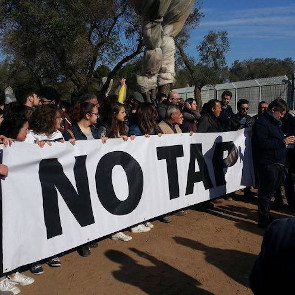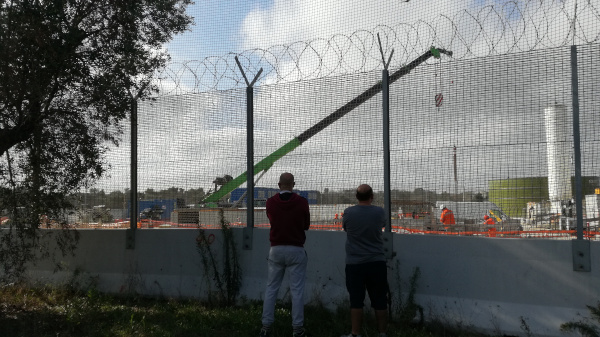Conviction of human rights defenders from No-TAP movement
On 19 March 2021, the Lecce Court of First Instance found 67 human rights defenders from the No-TAP movement guilty on charges of unauthorized protest, damage to private property, resistance to and contempt toward public officials and interruption of public service in three different legal cases. They were issued sentences ranging from three months to three and a half years imprisonment and/or fined up to €4280. A further 25 human rights defenders also on trial were acquitted.
On 9 January 2020, the Tribunal of Lecce considered the cases of 25 environmental rights defenders from the No-TAP movement, who had been protesting against the construction of the Trans Adriatic Pipeline (TAP) which would transport gas from Azerbaijan to Italy. The defenders faced the charges of participation in an unauthorised demonstration, road blockage, and insulting a public official, related to their participation in a peaceful protest in November 2017.
 No-TAP is a spontaneous citizen's initiative organising peaceful marches and events since 2011, aimed at raising awareness about the environmental impacts of the TAP project. The protests started in the town of Melendugno, located in the province of Lecce, where the terminal of the pipeline and the gas processing plants are currently being built. They have been staged primarily by residents of Melendugno, but also neighbouring towns which will be affected by the project. The human rights defenders have been protesting as the construction of the pipeline threatens ancient olive farms, water sources, cultural heritage sites and the local coastline, in a region which heavily depends on agriculture and tourism. Moreover, the local population was not consulted when the project was being discussed and approved, the environmental impact was not adequately assessed, as the “Seveso Law” (a law related to the prevention of industrial accidents) was not applied, and the project is contrary to the provisions of the Paris Agreement about progressively ending fossil fuel production.
No-TAP is a spontaneous citizen's initiative organising peaceful marches and events since 2011, aimed at raising awareness about the environmental impacts of the TAP project. The protests started in the town of Melendugno, located in the province of Lecce, where the terminal of the pipeline and the gas processing plants are currently being built. They have been staged primarily by residents of Melendugno, but also neighbouring towns which will be affected by the project. The human rights defenders have been protesting as the construction of the pipeline threatens ancient olive farms, water sources, cultural heritage sites and the local coastline, in a region which heavily depends on agriculture and tourism. Moreover, the local population was not consulted when the project was being discussed and approved, the environmental impact was not adequately assessed, as the “Seveso Law” (a law related to the prevention of industrial accidents) was not applied, and the project is contrary to the provisions of the Paris Agreement about progressively ending fossil fuel production.
On 19 March 2021, the Lecce Court of First Instance found 67 human rights defenders from the No-TAP movement guilty on charges of unauthorized protest, damage to private property, resistance to and contempt toward public officials and interruption of public service in three different legal cases. They were issued sentences ranging from three months to three and a half years imprisonment and/or fined up to €4280. A further 25 human rights defenders also on trial were acquitted.
The judgment was announced after an unusually expeditious trial, with 16 hearings relating to three different legal cases held over the past six months. The sentences handed down by judge Pietro Baffa, President of the Second Criminal section of the court of Lecce, went far beyond the requests of the prosecutors, who in many cases had asked for acquitta
On 11 September 2020, the trial of human rights defenders of the No-TAP (Trans-Adriatic Pipeline) movement got underway in the Tribunal of Lecce. Two further hearings took place on 25 September and 2 October 2020. During the latter hearing it was decided to separate the cases into three distinct proceedings, presided over by the same judge.
Read More About No-TAP in Cypher 03
The first case relates to the events of 9 December 2017, when a group of 58 human rights defenders were stopped during a walk near the “Red Zone”, an area established by prefectural order around the San Basilio building site of the TAP pipeline. The next hearing on this case is scheduled to take place on 16 October 2020.
The second case concerns the events of 8 December 2018, where 25 human rights defenders are accused of damaging the fence surrounding the TAP building site at Masseria del Capitano during a march organised in Melendugno against its construction. The defenders also face charges of “insulting a public official” and for violation of the "foglio di via" (order to stay away from a specific area). The next hearing is scheduled to take place on 13 November 2020.
The third proceeding consists of 78 charges related to approximately 15 incidents that took place between 2017 and 2018 against 46 defendants. The charges include “vandalising artistic property”, “insulting and resistance to public officials” and “holding a demonstration without prior notice”, among others. The next hearing is scheduled to take place on 4 December 2020.
On 9 January 2020, the first hearing of the case of 25 environmental rights defenders from the No-TAP movement who have been protesting against the construction of the Trans Adriatic Pipeline (TAP) took place at the Tribunal of Lecce. During the hearing, police officers and TAP Multinational personnel presented their testimonies against the defenders. The next hearing was scheduled for 14 May 2020, but the date remains uncertain as all tribunal activities in Italy have been suspended due to the COVID-19 crisis.
The defenders are facing the charges of participation in an unauthorised demonstration, road blockage, and insulting a public official, related to their participation in a peaceful protest in November 2017.
On 9 January 2020, the Tribunal of Lecce will consider the case of 25 environmental rights defenders from the No-TAP movement who have been protesting against the construction of the Trans Adriatic Pipeline (TAP) which will transport gas from Azerbaijan to Italy. The defenders are facing the charges of participation in an unauthorised demonstration, road blockage, and insulting a public official, related to their participation in a peaceful protest in November 2017.
No-TAP is a spontaneous citizen's initiative organising peaceful marches and events since 2011, aimed at raising awareness about the environmental impacts of the TAP project. The protests started in the town of Melendugno, located in the province of Lecce, where the terminal of the pipeline and the gas processing plants are currently being built. They have been staged primarily by residents of Melendugno, but also neighbouring towns which will be affected by the project. The human rights defenders have been protesting as the construction of the pipeline threatens ancient olive farms, water sources, cultural heritage sites and the local coastline, in a region which heavily depends on agriculture and tourism. Moreover, the local population was not consulted when the project was being discussed and approved, the environmental impact was not adequately assessed, as the “Seveso Law” (a law related to the prevention of industrial accidents) was not applied, and the project is contrary to the provisions of the Paris Agreement about progressively ending fossil fuel production. Members of the No-TAP movement have also raised concerns about alleged corruption involving Italian and Azeri government officials.
All 25 defendants in the upcoming trial face charges of participation in an unauthorised demonstration under Article 18 of the Laws of Public Security; 6 of them have been charged with blocking the road and the vehicles of the private surveillance company working for TAP under Articles 110, 610 and 612 of the Criminal Code; 3 defendants are facing the charge of offending a public official under Article 341 bis and 337 of the Criminal Code; and 9 individuals have been charged with "private violence" under Article 610 of the Criminal Code for blocking the road and TAP vehicles. The human rights defenders claim that their protest was legitimate and peaceful and that the road blockage occurred only because they were ordered by the police to stop and leave their vehicles close to the road in order to be identified.

The charges are related to events that took place in November 2017. During the night of 13 November 2017, the local government office (Prefettura) issued an ordinance establishing a “Red Zone” around the TAP pipeline building site, in San Foca di Melendugno (province of Lecce), making the area inaccessible for the public.
A few months earlier, the human rights defenders had established a permanent protest camp next to the building site, on land belonging to a private citizen who had given them authorisation to use it. Protesters were present on the camp site 24/7. On the night of 13 November 2017, the police and a private security firm, acting on behalf of the TAP Multinational, surrounded the Red Zone with their vehicles and did not allow the human rights defenders to leave the area until the following morning. Following the incident, two defenders filed a complaint against the police with the Public Prosecutor of Lecce, for kidnapping, abuse of power and private violence. To date, no investigation has been opened in relation to the complaint.
On the morning of 13 November 2017, when the defenders were finally allowed to leave the red zone, about twenty people started marching towards the town of Melendugno, to protest against the aforementioned incident as well as the militarisation of the area.
Dozens of peaceful protesters are currently under investigation facing fines of up to 8.000 euros. Moreover, twenty defenders are facing restrictions to their freedom of movement, as they have been prohibited from entering the municipality of Melendugno, where the TAP is being built. Some activists are also banned from entering the capital of the province, Lecce, and at least two people have lost their jobs because of this ban.
Front Line Defenders believes that the charges brought against the human rights defenders from the No-TAP movement are directly linked to their exercise of the rights to freedom of expression and peaceful assembly in order to defend environmental rights.
Front Line Defenders urges the Italian authorities to:
1. Immediately drop all charges against the 25 environmental rights defenders, lift restrictions to their freedom of movement and close the investigation concerning their participation in protests, as it is believed that these measures are solely motivated by their legitimate and peaceful activities in defence of human rights;
2. Guarantee in all circumstances that all human rights defenders in Italy are able to carry out their legitimate human rights activities without fear of reprisals and free of all restrictions including judicial harassment.
